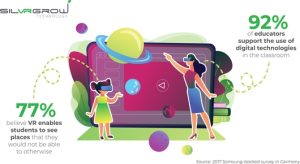Imagine walking along the rim of an active volcano or seeing ancient Roman ruins come to life before your eyes. Nowadays, you don’t necessarily have to imagine. Immersive technologies such as Virtual Reality (VR) and Augmented Reality (AR) bring vivid experiences like these to the classroom, with advocates highlighting the technology’s ability to inspire and grab the attention of young minds.
VR technology has evolved to the point where it is actually realizing its potential. And in terms of education, the implications could prove especially profound. If you are still on the fence about whether or not you should give VR a try in your school, here are 7 key benefits of VR in education.
1. Focused Immersion
This is somewhat of a logistical factor but does bear mentioning. The very nature of VR being framed inside a headset means that the learner is less prone to distractions in their physical surroundings. The immersive nature of VR means that learners are literally engulfed with learning and this, in turn, is a key factor in the retention of information.
The technology offers personalized learning that has been linked to greater academic progress and to deeper learning on a neurological level. The more a student takes their learning personally, the more and more deeply they take it in. And once a subject inspires a student, their brain actually changes and they are more receptive.
2. Multi-Sensory Experiences
Whilst tablets added touchscreen functionality to the multimedia experience of digital content, they don’t come with the kinesthetic experience afforded by virtual reality. Presence as the true magic of VR allows you to live a story rather than being a passive observer. It has the potential to make students think, feel, and even change their behavior.
Students can actually be inside of the experience and see in 3D what they would have previously only seen in a photo or illustration. This experiential knowledge deepens understanding in a way that two-dimensional books and ever computer screens cannot.
3. Increased Engagement
These days, millennials may perceive conventional classroom studying a bit boring. Research has shown that we remember 10% of what we read and up to 90% of what we do or simulate. It is scientifically proven that virtual reality keeps the user fully engaged and immersed in their new environment. It is an active rather than a passive way of learning.


4. Breaking Boundaries
The most common use of VR is providing the ability of virtual visits to distant or physically inaccessible places. VR has the potential to democratize education by bringing travel and educational opportunities to those who otherwise couldn’t access them. While taking multiple field trips throughout the school year can be cost-prohibitive, a virtual field trip is practically free.
VR brings an exciting adventure that will allow your students to become immersed in a virtual environment that has been designed to provide educational value. As the tour guides, teachers can deliver knowledge to their students as they observe the historical points of interest, scientific virtual environments, and much more.

5. VR Is Customizable
When it comes to virtual reality in schools, one size doesn’t fill all — and this is a huge advantage for both students and teachers. There are hundreds of different options available in the market that cater to a broad spectrum of educational needs as well as budgets. With various types of content such as 3D, VR, and 360-degree panoramic videos, schools can choose how they want to carry their own VR learning experience, and they can also choose to modify the program over time.
6. Create Cyber-Safe Classrooms
Using VR technology in the classroom eliminates the risks commonly associated with lesson plans that involve the use of the internet. With VR software, students can only access the content that has been created for them so there is no risk of them browsing websites or viewing materials that are not suitable for children.
7. Assist Students with Disabilities
Whether it be a physical or emotional disability, the aid of VR can help students to flourish. There are no physical boundaries with VR. Programs can be tailored made to assist those whose progress was once slow using traditional teaching methods. It opens up a number of doors of opportunity that was once deemed closed.
Supplementing Not Replacing
These are just a number of ways in which VR can help fill gaps in the learning process. However, as with any education technology, it must be strategically integrated into the educational curriculum, acting as a tool and enhancement, not as a replacement. VR immersion can demonstrate materials covered by a traditional lecture.
There are several great platforms in the market that can help schools of all kinds and sizes help their students learn more effectively, such as SilVRgrow. We lead in the art and science of creating unique learning experiences through a combination of story-telling and technical innovation. SilVRgrow’s flagship offering, FutureClass, is a STEM-based comprehensive education system that combines a full solution set, including a cloud-based teaching management platform, student VR headsets, and an extensive VR courseware, as well as 3D and 360º panorama resources.
We believe Virtual Reality is the next big technological platform evolving beyond the PC and smartphone. We are committed to promoting VR technology as a new, more effective delivery model in the classroom. At SilVRgrow, we want to help educators stay ahead of the curve when it comes to new ideas for integrating technology into schools.
Credit to: Silversea Media











